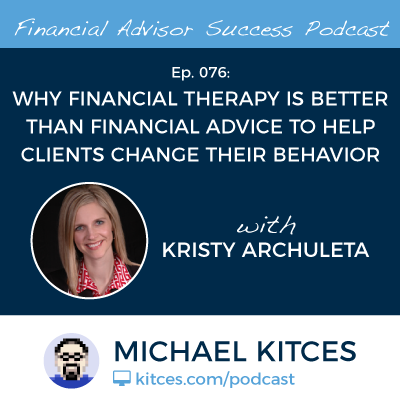 Welcome, everyone! Welcome to the 76th episode of the Financial Advisor Success Podcast!
Welcome, everyone! Welcome to the 76th episode of the Financial Advisor Success Podcast!
My guest on today's podcast is Kristy Archuleta. Kristy is an Associate Professor in the financial planning program at Kansas State University, with a focus on teaching advisors how to actually change their clients' behaviors for the better.
What's unique about Kristy, though, is that she's also a licensed marriage and family therapist, and comes to the world of financial planning and how to help clients improve their financial behaviors with the perspective of a trained psychologist.
In this episode, we talk in depth about Kristy's work at the intersection of financial planning and financial therapy, how a financial therapist would view common financial planning challenges from a different perspective with different solutions, the way that therapists approach helping clients to change their behavior by recognizing that clients are the best experts in their own lives, and why according to the best practices research of therapists themselves, what financial advisors typically do – give advice with a comprehensive list of recommendations to their clients about how to improve their financial lives – is actually not a good way to get them to change their financial behaviors for the better.
We also talk about Kristy's work in helping to co-found the Financial Therapy Association, the development of a new Certified Financial Therapist (or "CFT") program they're developing, why Kristy anticipates that financial therapy will eventually become a specialization path for financial planners... and where the line should still be drawn between the end of what advisors can do by providing financial therapy, and when it may still be necessary to involve a fully licensed mental health professional on the client's behalf.
And be certain to listen to the end, where Kristy talks about her own upcoming transition, from teaching financial planning and financial therapy at Kansas State University, to joining the financial planning program at the University of Georgia, to hopefully help them build more insights from financial therapy into their core financial planning curriculum as well.
So whether you are interested in learning more about the intersection between financial planning and financial therapy, how financial therapy can help clients improve their financial behaviors, or how financial therapists can become certified through programs such as the CFT, I hope you enjoy this episode of the Financial Advisor Success podcast!









 Welcome, everyone! Welcome to the 75th episode of the Financial Advisor Success Podcast!
Welcome, everyone! Welcome to the 75th episode of the Financial Advisor Success Podcast!
